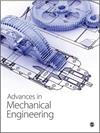The development of the fuel saving control strategy for 48 V P0 system: Design and experimental investigation
IF 2
4区 工程技术
Q3 ENGINEERING, MECHANICAL
引用次数: 0
Abstract
This paper presents a fuel consumption reduction control strategy for a newly-developed 48 V P0 mild hybrid electric vehicle and evaluates its fuel economy benefit experimentally. The strategy is designed with rule-based methods and utilizes various functions such as start-stop, torque boost, regeneration, load shift, BSG neutral mode and torque interventions with BSG. Fuel consumption comparison tests are performed in the WLTP cycle between the MHEV and the conventional vehicle. The authors evaluate the performance of specific key functions, analyze the energy flow of the 48 V battery, and calculate the fuel saving rate of the MHEV. The SOC of the 48 V battery is balanced in the WLTP cycle. The total energy charged to the 48 V battery is 378 Wh, of which 82% comes from the regeneration pattern. The total energy discharged from the 48 V battery is 355 Wh, of which 85% is consumed by the load shift pattern (BSG neutral state and Discharging state). The fuel consumption of the MHEV is reduced by 7.9% compared with the conventional vehicle in the WLTP cycle. The start-stop, BSG neutral, and torque interventions with BSG save fuel by 3.8%, 0.9%, and 0.5% respectively. The other hybrid functions save fuel by 2.7%.48 V P0 系统节油控制策略的开发:设计与实验研究
本文介绍了一种针对新开发的 48 V P0 轻度混合动力电动汽车的降低油耗控制策略,并通过实验评估了其燃油经济性。该策略采用基于规则的方法进行设计,并利用了多种功能,如启动-停止、扭矩提升、再生、负载转换、BSG 中性模式和带 BSG 的扭矩干预。在 WLTP 循环中,对 MHEV 和传统汽车进行了油耗对比测试。作者评估了特定关键功能的性能,分析了 48 V 电池的能量流,并计算了 MHEV 的节油率。在 WLTP 循环中,48 V 电池的 SOC 保持平衡。充入 48 V 电池的总能量为 378 Wh,其中 82% 来自再生模式。从 48 V 电池中放出的总能量为 355 Wh,其中 85% 由负载转换模式(BSG 中性状态和放电状态)消耗。在 WLTP 循环中,MHEV 的油耗比传统汽车降低了 7.9%。起停、BSG 空档和带 BSG 的扭矩干预分别节油 3.8%、0.9% 和 0.5%。其他混合动力功能可节省燃料 2.7%。
本文章由计算机程序翻译,如有差异,请以英文原文为准。
求助全文
约1分钟内获得全文
求助全文
来源期刊

Advances in Mechanical Engineering
工程技术-机械工程
CiteScore
3.60
自引率
4.80%
发文量
353
审稿时长
6-12 weeks
期刊介绍:
Advances in Mechanical Engineering (AIME) is a JCR Ranked, peer-reviewed, open access journal which publishes a wide range of original research and review articles. The journal Editorial Board welcomes manuscripts in both fundamental and applied research areas, and encourages submissions which contribute novel and innovative insights to the field of mechanical engineering
 求助内容:
求助内容: 应助结果提醒方式:
应助结果提醒方式:


